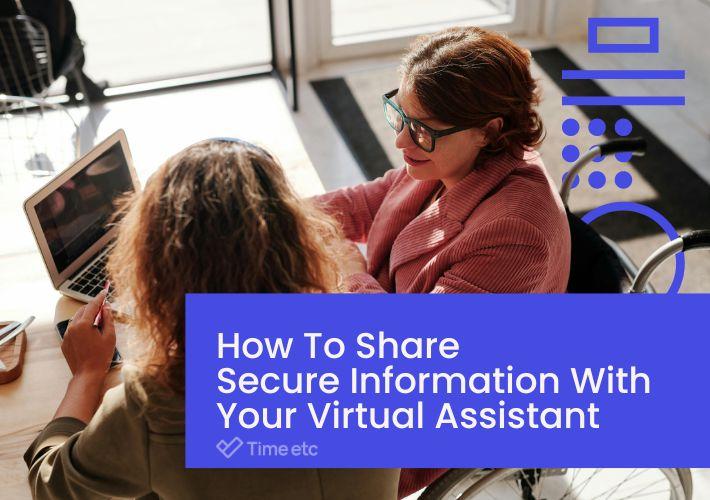Hiring a virtual assistant (VA) is a strategic move that allows you to focus on growing your business without being bogged down by daily administrative duties.
However, in an age where cyber threats and data breaches are more prevalent than ever, one of the most pressing concerns for individuals and businesses alike is how to protect sensitive information when outsourcing tasks to a virtual team.
With 17 years of experience in the world of virtual assistance and zero data breaches, we understand the critical importance of safeguarding your information.
In this article, we're delving into why data security is so important, the potential consequences when things go wrong, and the safest and most secure methods of sharing sensitive information online.
Why data security is essential when you outsource to a virtual assistant
In 2024, cybercrime is expected to cost the world over $9 trillion, a huge increase from the roughly $1 trillion before the pandemic. The digital transformation of the last five years has changed the way we work forever, and that's why these costs are going up.
Communication and collaboration tools have made it easier than ever to work from anywhere, but this also means there are more opportunities for hackers to access sensitive information.
Remember, keeping your data safe isn't just for big companies, or hiring remote employees. It's important for everyone, no matter how small your operations are.
The consequences of data breaches or leaks
Data breaches or leaks, including security breaches, can have severe consequences for businesses, whether they stem from a full-time, in-house employee or a virtual PA.
We can break down the fallout of data breaches or leaks into four distinct categories.
Financial costs
There are several financial costs associated with cybersecurity issues. They are:
Direct financial costs
- Data breach containment.
- Forensics and investigation.
- Possible legal fees.
- Fines or penalties from regulatory bodies.
Customer costs
Depending on the nature of the data leak, you may have to pay customer costs, such as:
- Compensation.
- Credit monitoring costs.
Operational costs
Cyberattacks also cause operational downtime as you scramble to investigate and remedy breaches. Some of the big costs involved include:
- Downtime for IT infrastructure.
- Extra investment in IT, including new protocols and systems.
- Reduced productivity as a result of the attack.
Reputational costs
A Verizon study suggests that almost 70% of customers would avoid a business that has suffered a data breach. Here are some ways a cybersecurity attack can hurt a business's credibility.
- Contracts are terminated or not renewed due to cybersecurity fears.
- Devaluation of brand, per Deloitte.
- Negative press, even if it’s just trade press in your niche.
Legal repercussions
We touched on this as part of the financial costs, but there are other concerns to consider too, including:
- Your regulatory licences coming under review.
- Lawsuits that result from cybersecurity negligence.
- Increased scrutiny from regulatory bodies, including time-consuming audits.
A data breach can have many severe consequences. Depending on your niche, some of these outcomes are more likely than others. We should also note that there are stringent rules and legal requirements around customer data if you work in fields like healthcare, finance, or insurance. Similarly, any business that has European customers must meet strict GDPR rules.

How to securely share information with your virtual assistant
From personal passwords to confidential business data, how can you make sure your data is safe when you outsource to a virtual assistant?
Develop specific policies for outsourced work
Most businesses will have specific rules for how their employees handle sensitive data. Typically, these policies are part of the onboarding process.
However, when it comes to outsourcing work, time is often limited for proper training. But don't worry! There are plenty of simple steps you can implement for remote workers that will help protect your business's sensitive data.
Access control
One of the best ways to keep your data safe when you outsource to a virtual assistant is through solid access control policies. Some good ideas here include:
- Set your VA up with their own individual account.
- Only grant your VA access to the data they need to do their job.
- Make sure that solid password procedures are followed.
- Consider using Two-Factor Authentication (2FA) for all logins for an additional layer of security.
Communications
The next thing to consider is how you manage communication between you and your virtual team members. The kind of work they'll do for you and the type of industry you're in will affect whether they need to work closely with everyone on your team or just communicate with you directly.
Either way, you should consider keeping all communication and file transfers on company-approved, encrypted communication platforms to keep everything safe, secure, and centralized.
Data
As a business owner, it's crucial to take data protection measures seriously to protect your and your customers' information.
When you hire VAs through fully managed services, data security is their top priority. Companies like Time etc have rock-solid confidentiality agreements in place with all their virtual assistants, but you may wish to have your own NDA or confidentiality agreement for an extra layer of reassurance.
Offboarding
Whether your staff work in-house or from a remote location, clear offboarding procedures are crucial for keeping business data safe when employees leave.
For example, you must revoke access to all company resources, including email, databases, digital assets, and cloud services. This usually means deactivating user accounts, retrieving company-issued devices, and making sure that all company data is returned or deleted from personal devices.
Robust offboarding steps also help businesses comply with data protection laws, showing clients and stakeholders that they take data security seriously. This builds trust and shows a commitment to keeping everyone’s information safe.

Choose the right tools for the job
While advances in communication tools may have made the remote work world more susceptible to security threats, there is also an abundance of technology available to create a safe and secure work environment.
1. Password managers
No matter who you outsource to, chances are they will need access to your accounts in order to complete tasks on your behalf. This could include social media platforms, online stores, company systems, online banking, or club memberships.
But, you don't have to risk compromising your security by handing over your login credentials and giving your virtual assistant complete control.
Instead, you can use password management tools to provide your VA with the access they need while keeping your accounts protected. This way, you can rest assured that your sensitive information is safe while still receiving the support you need.
Password managers like LastPass, 1Password, and NordPass work by storing encrypted versions of your password. So, for example, if you need to give your VA access to your online calendar, you can provide them with a login without revealing your actual passwords online.
Another great thing about these tools is that they're not just limited to storing and sharing passwords. You can use them to securely store and share access to pretty much all the confidential information they'll need for completing tasks, such as payment details, project files, and client information.
2. File sharing
File-sharing platforms allow seamless and instant access to documents, spreadsheets, and any other digital assets from any location, making them a must-have for virtual teams.
This quick and easy access means VAs can work more efficiently without the usual delays of emailing files back and forth. It also helps to make sure they always have the most up-to-date versions, which helps keep projects accurate and on track.
But of course, it's not just increased productivity and efficiency that makes these tools so valuable.
Secure file-sharing tools such as Google Drive, DropBox, and Box provide advanced security features to safeguard sensitive business information.
Features like version control, user permissions, and activity logs add an extra layer of security and transparency, allowing you to see changes, control who can view sensitive information, and keep a clear record of document updates.
3. Two-factor authentication tools
As we mentioned earlier, sometimes you’ll need to set up an account for your VA across your software tools. Two-factor authentication (2FA) tools are one of the best security measures you can implement to make sure that only authorized personnel can access critical accounts and platforms.
With 2FA tools, you're adding an extra barrier beyond the traditional username and password, significantly reducing the risk of a security breach. This extra step means that even if a password is compromised, malicious actors would still need another form of verification to gain access, such as a unique code sent to a mobile device.
Some of the best 2FA tools include:
4. Cloud-based collaboration tools
Cloud-based collaboration tools have a lot of advantages when it comes to workplace productivity. They also provide a secure environment for onboarding and working with a virtual assistant. These centralized workplaces offer simple and easy ways to grant permissions to your VA, share files, communicate, and collaborate.
Some of the best cloud-based communication tools on the market include:

Work with a reputable virtual assistant service
With so many options available in today's global market, finding a solid and reliable virtual assistant isn’t always straightforward.
First, you need to make sure they have the skills and experience needed to do a good job. Second, you need to vet any potential candidates and make sure they are who they say they are.
For most business owners, that’s a lot of work—and that's before you've even started working together! Thankfully, if you do your due diligence and work with a reputable virtual assistant service, this will all be taken care of for you. All you need to do is focus on integrating the assistant into your workflow and start reaping the benefits of their support.
At Time etc, we pride ourselves on providing the best virtual assistants for our clients' needs. That's why we have a thorough 10-stage selection process that carefully evaluates candidates for the right set of skills, experience, and education necessary to succeed in the role. Our high standards mean that, on average, only the top 2% of applicants make it through, so you can trust that you'll work with a highly competent virtual team.
What's the bottom line?
As technology continues to redefine the way we work, don't take any chances with your valuable data.
Having a strong system in place for sharing sensitive data not only safeguards your business, it also builds trust and confidence in your working relationship with your virtual team.
With a blend of technological solutions and prudent practices, such as adopting secure file-sharing tools and encrypted communication platforms and hiring VAs through reputable services, you can confidently delegate tasks to VAs without compromising confidentiality.
So, if you're ready to reap the benefits of outsourcing without compromising your business security, Time etc is here to help.
Since 2007, we've been a trusted partner to over 22,000 business owners and high-level executives, helping them feel more organized and less stressed—not to mention saving them up to 90% compared to hiring a full-time, in-house assistant!
Curious to see the difference for yourself?
Speak to our expert team to get started, and we'll handle the rest! We'll match you with a skilled virtual assistant based on your unique business needs, so you can start doing more of what matters most.
Still on the fence?
Try us out for free today!










